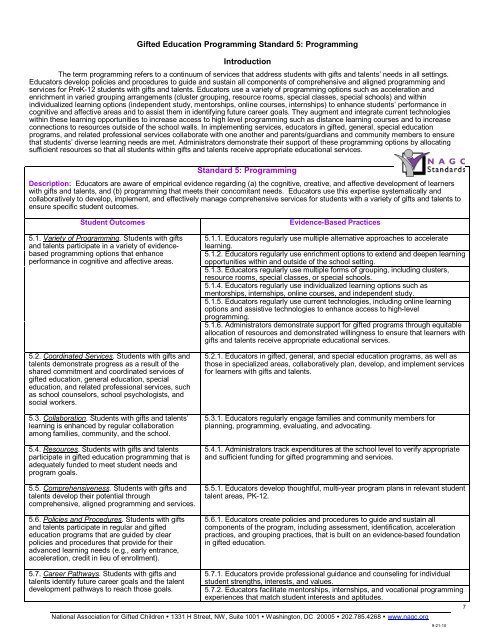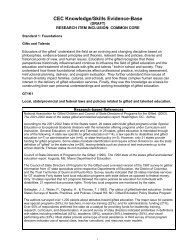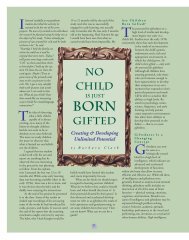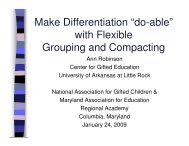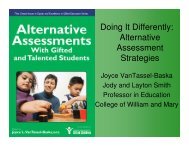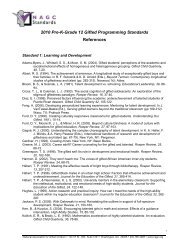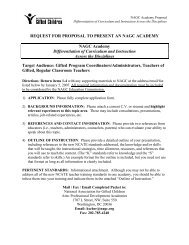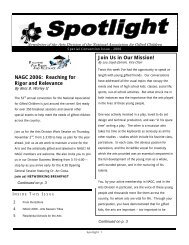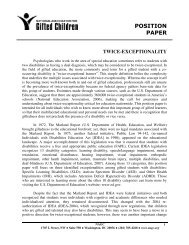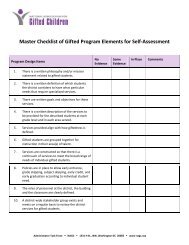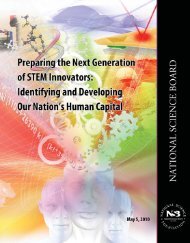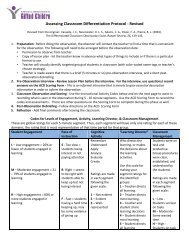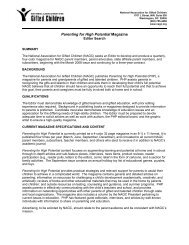2010 Pre-K-Grade 12 Gifted Programming Standards - NAGC
2010 Pre-K-Grade 12 Gifted Programming Standards - NAGC
2010 Pre-K-Grade 12 Gifted Programming Standards - NAGC
Create successful ePaper yourself
Turn your PDF publications into a flip-book with our unique Google optimized e-Paper software.
<strong>Gifted</strong> Education <strong>Programming</strong> Standard 5: <strong>Programming</strong><br />
Introduction<br />
The term programming refers to a continuum of services that address students with gifts and talents’ needs in all settings.<br />
Educators develop policies and procedures to guide and sustain all components of comprehensive and aligned programming and<br />
services for <strong>Pre</strong>K-<strong>12</strong> students with gifts and talents. Educators use a variety of programming options such as acceleration and<br />
enrichment in varied grouping arrangements (cluster grouping, resource rooms, special classes, special schools) and within<br />
individualized learning options (independent study, mentorships, online courses, internships) to enhance students’ performance in<br />
cognitive and affective areas and to assist them in identifying future career goals. They augment and integrate current technologies<br />
within these learning opportunities to increase access to high level programming such as distance learning courses and to increase<br />
connections to resources outside of the school walls. In implementing services, educators in gifted, general, special education<br />
programs, and related professional services collaborate with one another and parents/guardians and community members to ensure<br />
that students’ diverse learning needs are met. Administrators demonstrate their support of these programming options by allocating<br />
sufficient resources so that all students within gifts and talents receive appropriate educational services.<br />
Standard 5: <strong>Programming</strong><br />
Description: Educators are aware of empirical evidence regarding (a) the cognitive, creative, and affective development of learners<br />
with gifts and talents, and (b) programming that meets their concomitant needs. Educators use this expertise systematically and<br />
collaboratively to develop, implement, and effectively manage comprehensive services for students with a variety of gifts and talents to<br />
ensure specific student outcomes.<br />
Student Outcomes<br />
5.1. Variety of <strong>Programming</strong>. Students with gifts<br />
and talents participate in a variety of evidencebased<br />
programming options that enhance<br />
performance in cognitive and affective areas.<br />
5.2. Coordinated Services. Students with gifts and<br />
talents demonstrate progress as a result of the<br />
shared commitment and coordinated services of<br />
gifted education, general education, special<br />
education, and related professional services, such<br />
as school counselors, school psychologists, and<br />
social workers.<br />
5.3. Collaboration. Students with gifts and talents’<br />
learning is enhanced by regular collaboration<br />
among families, community, and the school.<br />
5.4. Resources. Students with gifts and talents<br />
participate in gifted education programming that is<br />
adequately funded to meet student needs and<br />
program goals.<br />
5.5. Comprehensiveness. Students with gifts and<br />
talents develop their potential through<br />
comprehensive, aligned programming and services.<br />
5.6. Policies and Procedures. Students with gifts<br />
and talents participate in regular and gifted<br />
education programs that are guided by clear<br />
policies and procedures that provide for their<br />
advanced learning needs (e.g., early entrance,<br />
acceleration, credit in lieu of enrollment).<br />
Evidence-Based Practices<br />
5.1.1. Educators regularly use multiple alternative approaches to accelerate<br />
learning.<br />
5.1.2. Educators regularly use enrichment options to extend and deepen learning<br />
opportunities within and outside of the school setting.<br />
5.1.3. Educators regularly use multiple forms of grouping, including clusters,<br />
resource rooms, special classes, or special schools.<br />
5.1.4. Educators regularly use individualized learning options such as<br />
mentorships, internships, online courses, and independent study.<br />
5.1.5. Educators regularly use current technologies, including online learning<br />
options and assistive technologies to enhance access to high-level<br />
programming.<br />
5.1.6. Administrators demonstrate support for gifted programs through equitable<br />
allocation of resources and demonstrated willingness to ensure that learners with<br />
gifts and talents receive appropriate educational services.<br />
5.2.1. Educators in gifted, general, and special education programs, as well as<br />
those in specialized areas, collaboratively plan, develop, and implement services<br />
for learners with gifts and talents.<br />
5.3.1. Educators regularly engage families and community members for<br />
planning, programming, evaluating, and advocating.<br />
5.4.1. Administrators track expenditures at the school level to verify appropriate<br />
and sufficient funding for gifted programming and services.<br />
5.5.1. Educators develop thoughtful, multi-year program plans in relevant student<br />
talent areas, PK-<strong>12</strong>.<br />
5.6.1. Educators create policies and procedures to guide and sustain all<br />
components of the program, including assessment, identification, acceleration<br />
practices, and grouping practices, that is built on an evidence-based foundation<br />
in gifted education.<br />
5.7. Career Pathways. Students with gifts and<br />
talents identify future career goals and the talent<br />
development pathways to reach those goals.<br />
5.7.1. Educators provide professional guidance and counseling for individual<br />
student strengths, interests, and values.<br />
5.7.2. Educators facilitate mentorships, internships, and vocational programming<br />
experiences that match student interests and aptitudes.<br />
National Association for <strong>Gifted</strong> Children • 1331 H Street, NW, Suite 1001 • Washington, DC 20005 • 202.785.4268 • www.nagc.org<br />
9-21-10<br />
7


